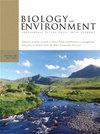The delivery of ecosystem services through results-based agri-environment payment schemes (RBPS): three Irish case studies
IF 0.6
4区 环境科学与生态学
Q4 ENVIRONMENTAL SCIENCES
Biology and Environment-Proceedings of the Royal Irish Academy
Pub Date : 2022-01-01
DOI:10.3318/bioe.2020.13
引用次数: 3
Abstract
Abstract:A number of European Innovation Partnerships (EIPs) were funded by the Department of Agriculture Food and the Marine through the 2013–2020 Rural Development Programme (RDP). Their objectives relate to restoring, preserving and enhancing ecosystems. Three of the EIPs—Caomhnú Árann, the Hen Harrier Project and the Pearl Mussel Project—have varying targets and scale but they all pay for the delivery of ecosystem services whilst also supporting vibrant, rural farming communities. This is achieved by using a results-based payments approach where farmers are rewarded for the quality of habitat that they maintain on their farms in addition to the food products that they produce. The EIPs allow for an adaptive approach, which means programmes can be tailored to meet the specific needs and challenges of a particular biogeographical area. In this way, vital ecosystem services such as biodiversity, conservation of nationally rare species and habitats, carbon sequestration and storage, improved water quality, agricultural biodiversity, flood resilience and fire resilience can be delivered, protected and conserved while farmers are rewarded for doing so. These three EIPs provide a model by which this wide range of ecosystem services can be delivered through a results-based agri-environment (AE) payments approach, using habitat quality as a result indicator or surrogate for these services to which payment levels are linked.通过基于结果的农业环境支付计划(RBPS)提供生态系统服务:三个爱尔兰案例研究
摘要:2013-2020年农村发展计划(RDP)资助了一系列欧洲创新伙伴关系(eip)。它们的目标与恢复、保护和加强生态系统有关。其中的三个项目(EIPs-Caomhnú Árann),母鸡鹞项目和珍珠贻贝项目的目标和规模各不相同,但它们都为提供生态系统服务提供了资金,同时也支持了充满活力的农村农业社区。这是通过使用基于结果的支付方法来实现的,在这种方法中,除了他们生产的食品之外,农民还可以根据他们在农场中维护的栖息地的质量获得奖励。eip允许采用适应性方法,这意味着可以对项目进行调整,以满足特定生物地理区域的具体需求和挑战。通过这种方式,重要的生态系统服务,如生物多样性、国家珍稀物种和栖息地保护、碳封存和储存、改善水质、农业生物多样性、抗洪能力和抗火能力,可以得到交付、保护和养护,同时农民也因此得到奖励。这三个eip提供了一个模型,通过基于结果的农业环境(AE)支付方法,使用栖息地质量作为与支付水平相关的这些服务的结果指标或替代品,可以提供这种广泛的生态系统服务。
本文章由计算机程序翻译,如有差异,请以英文原文为准。
求助全文
约1分钟内获得全文
求助全文
来源期刊
CiteScore
1.10
自引率
0.00%
发文量
6
审稿时长
>36 weeks
期刊介绍:
The journal aims to offer a broad coverage of the subject area, including the following:
- biology and ecology of the Irish flora and fauna
- microbial ecology
- animal, plant and environmental physiology
- global change
- palaeoecology and palaeoclimatology
- population biology; conservation of genetic resources
- pollution and environmental quality; ecotoxicology
- environmental management
- hydrology
- land use, agriculture, soils and environment.
Submissions on other relevant topics are also welcome, and papers of a cross-disciplinary nature are particularly encouraged.

 求助内容:
求助内容: 应助结果提醒方式:
应助结果提醒方式:


